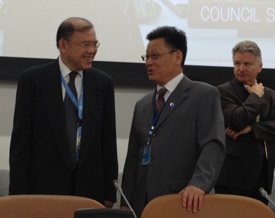- Supachai Panitchpakdi, Secretary-General of UNCTAD
- Min Zhu, Deputy Managing Director, IMF
- Valentine Rugwabiza, Deputy Director-General, World Trade Organization
- Hans Timmer, Director of the Development Prospects Group, World Bank
 Supachai Panitchpakdi (UNCTAD) with Sha Zukang (DESA) |
According to a UN Department of Public Information press release issued at the end of the session, Mr. Sha stated in his opening remarks that “the world’s economic prospects remain sombre and challenging.”
The global economy was projected to grow by 2.5 per cent in 2012 and 3.1 percent in 2013, but weaknesses in developed economies continued to feed into each other and unemployment remained high. Some 45-50 million new jobs were needed annually just to return to pre-crisis employment levels.
“We are not getting even close to this target,” he warned. To do so, far more supportive economic policies were needed. Moreover, the cooperative response following the outbreak of the crisis risked fading quickly, and “the world cannot afford this”.
“Are you really satisfied with the way global economic governance is being practiced at the moment?” asked Mr. Supachai, who warned the Council in his presentation that “we are inching towards […] a real danger of a repeat of that calamity of 2008-2009.” That was largely because there was currently no leadership, no coordination, no inclusion or sharing of authority in determining the agenda of the future. States must be mindful that “we are just floating, drifting with no clear global agenda”. He wondered whether the world could rely solely on G20 deliberations taking place twice a year for a day or two as a way to steer the future.
Giving a brief snapshot of some of the more troubling dimensions of the jobs crisis, he said that presently, many long-term unemployed people had become disenchanted and had left the labour force, there was an alarming level of youth unemployment and wage levels were declining. Another worrying trend was the resurgence of harmful practices — such as excessive bonuses and the manipulation of interest rates — in the world’s major banks. It was therefore of paramount importance to address the “grave deficiencies” in global economic governance. “We must bite the bullet and be really strong in dealing with the issues of financial reform,” he stressed in that regard.
Painting a similarly dire picture, Mr. Zhu agreed that the global economy was in “a synchronized slowdown”. There was even cause for concern in developing countries — many of which enjoyed strong rates of growth — including volatile capital flows, commodity prices, escalated risk and little viable space for policy options. Issuing a number of prescriptions in that regard, he stressed that structural reform was particularly important, as was the creation and maintenance of social protection initiatives for the world’s most vulnerable. It was also vital for donor countries to keep their commitment and continue supporting low-income countries.
Ms. Rugwabiza said that, in difficult times, the world must resist the temptation to resort to protectionist trade measures, which often harmed developing countries. “Hard-won developmental achievements of the past decade are in danger of unravelling,” she warned in that regard. She said an agreement on trade facilitation was a possible outcome of the currently ongoing “Doha Round” of WTO negotiations.
Other panellists also struck a note of optimism, emphasizing a number of key areas in which States might use their available policy space to strengthen the world’s long-term economic prospects. In that regard, Mr. Timmer agreed that a shift towards structural adjustments — changes in the basic framework of an economy through policy reform — was vital to averting another global crisis. In that respect, developing countries, whose policies were already forward-looking and focused on structural policies, were in “much better shape” than developed countries, which were currently focused on short-term fixes.
